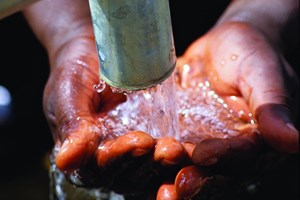Residents in St. Croix sue government over water contaminated with lead and copper
SAN JUAN, Puerto Rico (AP) — A group of residents have sued a public utility company in the U.S. Virgin Islands after authorities there reported finding high levels of lead and copper in the tap water on St. Croix. The report caused panic and forced tens of thousands to rely on bottled water.
The class-action lawsuit, which is expected to be served in the coming days, accuses the U.S. territory’s Water and Power Authority and Seven Seas Water Corporation of improper monitoring and failing to provide safe water, among other things.
Andrew Smith, the public utility’s CEO, condemned the lawsuit on Wednesday. He said the agency acted swiftly and transparently after the test results became available and that officials are still working to improve water quality in St. Croix.
“We … are disappointed that amidst these challenging circumstances, there are those who seek monetary gain by exploiting the evolving situation impacting the people of St. Croix,” he said in a statement.
Seven Seas Water Corporation, a Florida-based company that runs a plant on St. Croix and provides water to the public utility for distribution, did not respond to a message seeking comment.
Lee J. Rohn, whose firm filed the lawsuit last week, said in an interview Wednesday that her clients have children whose blood tests show high levels of lead in their system.
“It would be narrow-minded at best to limit this to some idea that somebody is looking for monetary gain,” she said. “What people are looking for is justice.”
The investigation into the state of tap water in St. Croix began in late September, following complaints of reddish-brown water on the island of more than 50,600 people. In late October, the local government announced that officials found high levels of lead and copper and warned people not to drink their tap water.
As testing continued, the governor of the U.S. Virgin Islands announced a state of emergency, with President Joe Biden doing the same earlier this month as residents in St. Croix received vouchers for bottled water.
However, experts contacted by The Associated Press have said the results could be false because the testing did not meet standards set by the U.S. Environmental Protection Agency.
Rohn, the attorney, dismissed that possibility, saying her clients have high levels of lead in their systems. She also criticized the government for announcing a couple of weeks ago that lead levels were low or undetectable at samples taken from various schools across St. Croix.
“There should be no levels of lead,” she said. “The people can’t drink their water. They can’t bathe in their water. They can’t cook with their water. They can’t brush their teeth with their water, and they’re being told by WAPA that they should spend money to fix their own plumbing.”
Lead is a heavy metal that can damage a child’s brain and nervous system, slow development and cause hearing and speech problems, according to the U.S. Centers for Disease Control and Prevention.
The lawsuit states that to make “matters worse, residents do not know how long they have been exposed to elevated levels of lead and copper in their water as WAPA has indicated that it only tests its water for these substances every three years.”
The complaint seeks reimbursement for all expenses incurred by those affected and also replacement of all lead service lines at no cost to customers.
Rohn also criticized that taxpayer money was being used to fund vouchers for bottled water. She said there should be a better distribution method for safe drinking water given that some residents are elderly and unable to leave their home.
Related News
From Archive

- Glenfarne Alaska LNG targets late-2026 construction start for 807-mile pipeline project
- U.S. water reuse boom to fuel $47 billion in infrastructure spending through 2035
- $2.3 billion approved to construct 236-mile Texas-to-Gulf gas pipeline
- Major water pipe break in Puerto Rico hits over 165,000 customers
- Potomac River Tunnel project enters construction phase beneath Washington, D.C.
- Pennsylvania American Water launches interactive map to identify, replace lead water service lines
- Trump's tariffs drive $33 million cost increase for Cincinnati sewer project
- Utah city launches historic $70 million tunnel project using box jacking under active rail line
- Tulsa residents warned after sewer lines damaged by boring work
- Fatal trench collapse halts sewer construction in Massachusetts; two workers hospitalized




Comments